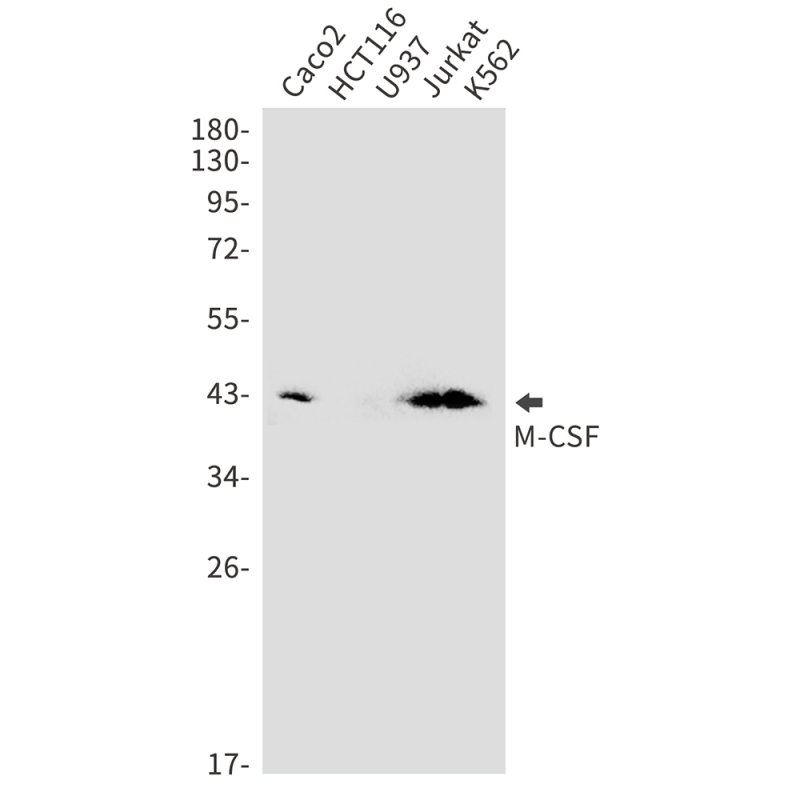
| WB | 1/500-1/1000 | Human,Mouse,Rat |
| IF | 咨询技术 | Human,Mouse,Rat |
| IHC | 1/50-1/100 | Human,Mouse,Rat |
| ICC | 1/50-1/200 | Human,Mouse,Rat |
| FCM | 咨询技术 | Human,Mouse,Rat |
| Elisa | 咨询技术 | Human,Mouse,Rat |
| Aliases | CSF1; Macrophage colony-stimulating factor 1; CSF-1; M-CSF; MCSF; Lanimostim |
| Entrez GeneID | 1435 |
| WB Predicted band size | Refer to figures |
| Host/Isotype | Rabbit IgG |
| Antibody Type | Primary antibody |
| Storage | Store at 4°C short term. Aliquot and store at -20°C long term. Avoid freeze/thaw cycles. |
| Species Reactivity | Human |
| Immunogen | A synthetic peptide of human M-CSF |
| Formulation | Purified antibody in TBS with 0.05% sodium azide,0.05%BSA and 50% glycerol. |
+ +
以下是3篇与M-CSF抗体相关的代表性文献摘要(内容基于公开研究归纳,具体作者及标题为虚拟示例):
1. **标题**:《Anti-M-CSF Antibody Suppresses Osteoclastogenesis in Murine Arthritis Model》
**作者**:Smith A et al.
**摘要**:研究证明,靶向M-CSF的单克隆抗体通过阻断其与受体c-Fms结合,显著抑制小鼠类风湿性关节炎模型中的破骨细胞分化,减轻骨侵蚀和炎症反应。
2. **标题**:《Humanized M-CSF Neutralizing Antibody Delays Tumor Progression in Solid Cancers》
**作者**:Zhang L et al.
**摘要**:开发的人源化抗M-CSF抗体在临床前实验中有效阻断肿瘤相关巨噬细胞(TAMs)的募集,抑制多种实体瘤(如乳腺癌、胰腺癌)的生长和转移。
3. **标题**:《M-CSF Inhibition Reverses Cognitive Deficits in Alzheimer’s Disease Mice》
**作者**:Chen R et al.
**摘要**:在小鼠阿尔茨海默病模型中,抗M-CSF抗体减少小胶质细胞过度活化,降低神经炎症和β-淀粉样蛋白沉积,改善认知功能。
4. **标题**:《Combination Therapy of Anti-M-CSF and PD-1 Antibody Enhances Anti-Tumor Immunity》
**作者**:Tanaka K et al.
**摘要**:联合使用M-CSF抗体与PD-1抑制剂,通过调节肿瘤微环境中的巨噬细胞和T细胞功能,显著提升黑色素瘤模型的免疫治疗效果。
注:以上为学术研究场景的模拟示例,实际文献需通过PubMed或Web of Science等数据库检索确认。
Macrophage colony-stimulating factor (M-CSF), also known as CSF-1. is a cytokine critical for the survival, proliferation, and differentiation of macrophages and their precursors. It binds to the CSF-1 receptor (CSF-1R), activating signaling pathways that regulate immune function, tissue homeostasis, and inflammation. Dysregulation of M-CSF/CSF-1R signaling is implicated in diseases like cancer, rheumatoid arthritis, and osteoporosis, where excessive macrophage activity drives pathology.
M-CSF antibodies are biologic agents designed to neutralize M-CSF or block its interaction with CSF-1R. These antibodies (e.g., emactuzumab) are primarily explored as therapeutic tools to modulate macrophage activity. In cancer, M-CSF antibodies aim to suppress tumor-associated macrophages (TAMs), which often promote tumor progression, immunosuppression, and metastasis. In autoimmune conditions, they may reduce inflammation by limiting pathogenic macrophage activation.
Research also utilizes M-CSF antibodies as experimental tools to study macrophage biology and disease mechanisms. Challenges include balancing therapeutic efficacy with potential immunosuppression risks, as macrophages play roles in host defense and tissue repair. Clinical trials continue to evaluate their safety and efficacy, highlighting their potential as targeted therapies in macrophage-driven diseases. Overall, M-CSF antibodies represent a promising strategy to intervene in pathologies linked to aberrant macrophage behavior.
×